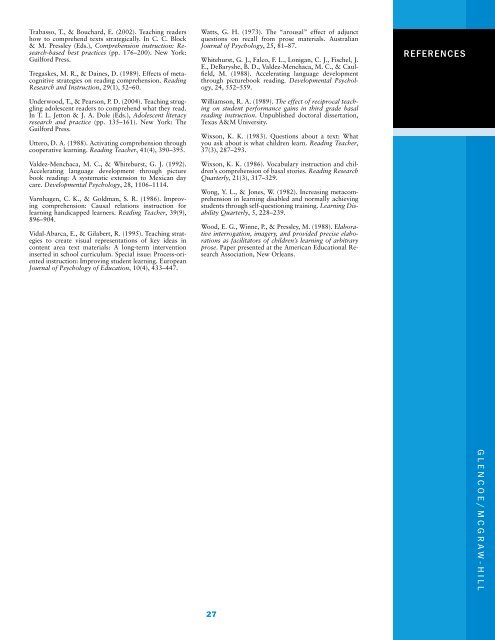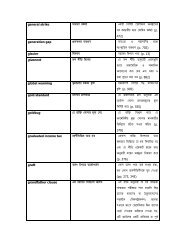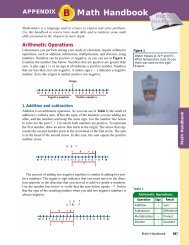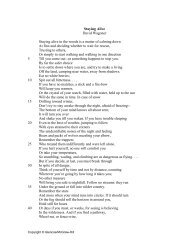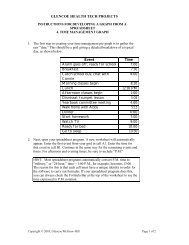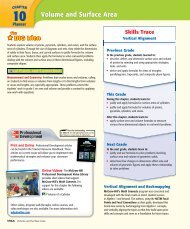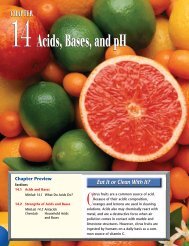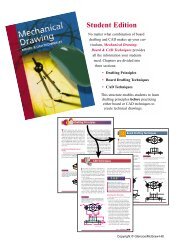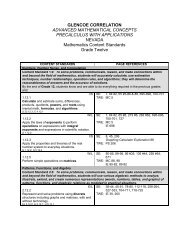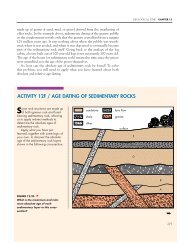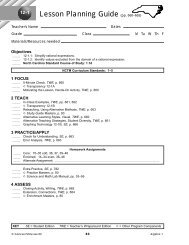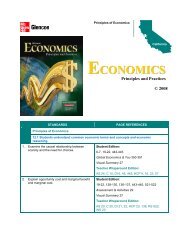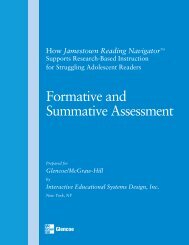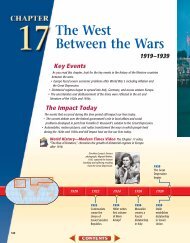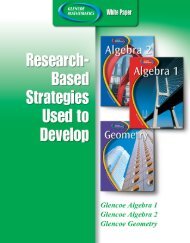eferences J a m e s t o w n R e a d i n g N a v i g a t o r Schmitt, M. C. (1988). The effects of an elaborated directed reading activity on the metacomprehension skills of third graders. National Reading Conference Yearbook, 37, 167–181. Schraw, G. (1998). Promoting general metacognitive awareness. Instructional Science, 26, 113–125. Schunk, D. H., & Rice, J. M. (1984). Strategy self-verbalization during remedial listening comprehension instruction. Journal of Experimental Education, 53(1), 49–54. Schunk, D. H., & Rice, J. M. (1985). Verbalization of comprehension strategies: Effects on children’s achievement outcomes. Human Learning: Journal of Practical <strong>Research</strong> and Applications, 4(1), 1–10. Serenty, M. L., & Dean, R. S. (1986). Interspersed post passage questions and reading comprehension achievement. Journal of Educational Psychology, 78(3), 228– 229. Sheldon, S. A. (1984). Comparison of two teaching methods for reading comprehension. Journal of <strong>Research</strong> in Reading, 7(1), 41–52. Short, E. J., & Ryan, E. B. (1984). Metacognitive differences between skilled and less skilled readers: Remediating deficits through story grammar and attribution training. Journal of Educational Psychology, 76(2), 225–235. Shortland-Jones, B. (1986). The development and testing of an instructional strategy for improving reading comprehension based on schema and metacognitive theories. Unpublished doctoral dissertation, University of Oregon. Shriberg, L. K., Levin, J. R., McCormick, C. B., & Pressley, M. (1982). Learning about “famous” people via the keyword method. Journal of Educational Psychology, 74, 238–247. Silven, M. (1992). The role of metacognition in reading instruction. Scandinavian Journal of Educational <strong>Research</strong>, 36(3), 211–221. Simmons, D. C., et al. (1988). Effects of teacher-constructed pre- and post-graphic organizer instruction on sixth-grade science students’ comprehension and recall. Journal of Educational <strong>Research</strong>, 82(1), 15–21. Simpson, P. S. (1989). The effects of direct training in active comprehension on reading achievement, self-concepts, and reading attitudes of at-risk sixth grade students. Unpublished doctoral dissertation, Texas Technological University. Sinatra, R. C., Stahl-Gemake, J., & Berg, D. N. (1984). Improving reading comprehension of disabled readers through semantic mapping. Reading Teacher, 38(1), 22–29. Sindelar, P. T. (1982). The effects of cross-aged tutoring on the comprehension skills of remedial reading students. Journal of Special Education, 16(2), 199–206. Singer, H., & Donlan, D. (1982). Active comprehension: Problem-solving schema with question generation for comprehension of complex short stories. Reading <strong>Research</strong> Quarterly, 17(2), 166–186. Sjostrom, C. L., & Hare, V. C. (1984). Teaching high school students to identify main ideas in expository text. Journal of Educational <strong>Research</strong>, 78(2), 114–118. Smith, K., Johnson, D. W., & Johnson, R. T.(1981). Can conflict be constructive? Controversy versus concurrence seeking in learning groups. Journal of Educational Psychology, 73(5), 651–663. 26 Smith, N. J. (1977). The effects of training teachers to teach students at different reading ability levels to formulate three types of questions on reading comprehension and question generation ability. Unpublished doctoral dissertation, University of Georgia. Soriano, M., Vidal-Abarca, E., & Miranda, A. (1996). Comparación de dos procedimentos de instrucción en comprensión y aprendizaje de textos: Instrucción directa y enseñanza recíproca. [Comparison of two procedures for instruction in comprehension and text learning: Direct instruction and reciprocal teaching.] Infancia y Aprendizaje, 74, 57–65. Spiegel, D. L., & Fitzgerald, J. (1986). Improving reading comprehension through instruction about story parts. Reading Teacher, 39(7), 676–682. Spires, H. A., Gallini, J., & Riggsbee, J. (1992). Effects of schema-based and text structure-based cues on expository prose comprehension in fourth graders. Journal of Experimental Education, 60(4), 307–320. Stahl, S. A., & Fairbanks, M. M. (1986). The effects of vocabulary instruction: A model-based meta-analysis. Review of Educational <strong>Research</strong>, 56(1), 72–110. Stanovich, K. E., & Cunningham, A. E. (1993). Where does knowledge come from? Specific associations between print exposure and information acquisition. Journal of Educational Psychology, 85, 211–229. Stevens, R. J. (1988). Effects of strategy training on the identification of the main idea of expository passages. Journal of Educational Psychology, 80(1), 21–26. Stevens, R. J., Madden, N. A., Slavin, R. E., & Farnish, A. M. (1987). Cooperative integrated reading and composition: Two field experiments. Reading <strong>Research</strong> Quarterly, 22(4), 433–454. Stevens, R. J., Slavin, R. E., & Farnish, A. M.(1991). The effects of cooperative learning and instruction in reading comprehension strategies on main idea identification. Journal of Educational Psychology, 83(1), 8–16. Swan, E. A. (2003). Concept-oriented reading instruction: Engaging classrooms, lifelong learners. New York: Guilford Press. Taylor, B. M. (1982). Text structure and children’s comprehension and memory for expository material. Journal of Educational Psychology, 74(3), 323–340. Taylor, B. M. (1986). Teaching middle-grade students to read for main ideas. In J. A. Niles & R. V. Lalik (Eds.), Solving problems in literacy: Learners, teachers, and researchers: Thirty-fifth Yearbook of the National Reading Conference (pp. 99–108). Rochester, NY: National Reading Conference. Taylor, B. M., & Beach, R. W. (1984). The effects of text structure instruction on middle-grade students’ comprehension and production of expository prose. Reading <strong>Research</strong> Quarterly, 19, 134–136. Taylor, B. M., & Frye, B. J. (1992). <strong>Comprehension</strong> strategy instruction in the intermediate grades. Reading <strong>Research</strong> and Instruction, 32(1), 39–48. Taylor, B. M., Frye, B. J., & Maruyama, G. M. (1990). Time spent reading and reading growth. American Educational <strong>Research</strong> Journal, 27(2), 351–362. Tharp, R. G. (1982). The effective instruction of comprehension: Results and description of the Kamehameha Early Education Program. Reading <strong>Research</strong> Quarterly, 17(4), 503–527.
Trabasso, T., & Bouchard, E. (2002). Teaching readers how to comprehend texts strategically. In C. C. Block & M. Pressley (Eds.), <strong>Comprehension</strong> instruction: <strong>Research</strong>-based best practices (pp. 176–200). New York: Guilford Press. Tregaskes, M. R., & Daines, D. (1989). Effects of metacognitive strategies on reading comprehension. Reading <strong>Research</strong> and Instruction, 29(1), 52–60. Underwood, T., & Pearson, P. D. (2004). Teaching struggling adolescent readers to comprehend what they read. In T. L. Jetton & J. A. Dole (Eds.), Adolescent literacy research and practice (pp. 135–161). New York: The Guilford Press. Uttero, D. A. (1988). Activating comprehension through cooperative learning. Reading Teacher, 41(4), 390–395. Valdez-Menchaca, M. C., & Whitehurst, G. J. (1992). Accelerating language development through picture book reading: A systematic extension to Mexican day care. Developmental Psychology, 28, 1106–1114. Varnhagen, C. K., & Goldman, S. R. (1986). Improving comprehension: Causal relations instruction for learning handicapped learners. Reading Teacher, 39(9), 896–904. Vidal-Abarca, E., & Gilabert, R. (1995). Teaching strategies to create visual representations of key ideas in content area text materials: A long-term intervention inserted in school curriculum. Special issue: Process-oriented instruction: Improving student learning. European Journal of Psychology of Education, 10(4), 433–447. Watts, G. H. (1973). The “arousal” effect of adjunct questions on recall from prose materials. Australian Journal of Psychology, 25, 81–87. Whitehurst, G. J., Falco, F. L., Lonigan, C. J., Fischel, J. E., DeBaryshe, B. D., Valdez-Menchaca, M. C., & Caulfield, M. (1988). Accelerating language development through picturebook reading. Developmental Psychology, 24, 552–559. Williamson, R. A. (1989). The effect of reciprocal teaching on student performance gains in third grade basal reading instruction. Unpublished doctoral dissertation, Texas A&M University. Wixson, K. K. (1983). Questions about a text: What you ask about is what children learn. Reading Teacher, 37(3), 287–293. Wixson, K. K. (1986). Vocabulary instruction and children’s comprehension of basal stories. Reading <strong>Research</strong> Quarterly, 21(3), 317–329. Wong, Y. L., & Jones, W. (1982). Increasing metacomprehension in learning disabled and normally achieving students through self-questioning training. Learning Disability Quarterly, 5, 228–239. Wood, E. G., Winne, P., & Pressley, M. (1988). Elaborative interrogation, imagery, and provided precise elaborations as facilitators of children’s learning of arbitrary prose. Paper presented at the American Educational <strong>Research</strong> Association, New Orleans. references G l e n c o e / M c G r a w - H i l l 27


